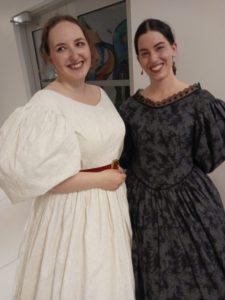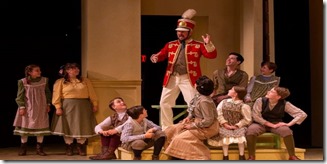Reviewed Monday, June 20, 2022, by Laurie Fyffe
A shipwreck! A deserted island! A tale of betrayal, revenge, magic and love! Welcome to William Shakespeare’s The Tempest.
When a timely storm, whipped up by the mighty Prospero, a being possessed of the magic arts, lands a shipped wrecked crew on an Island, thus begins a tale that delves into past betrayals but concludes – eventually – with forgiveness and the union of two young lovers. Under the appropriately whimsical direction of Tamara Freeman, The Tempest is set in motion at the height of a storm with a delightful shipwreck scene then carried along on the crest of a wave by clever magical interventions. With the aid of a little stop start motion from the actors, Freeman has found an inventive way of demonstrating Prospero’s magical powers. These comic bits are well supported by an energetic cast playing multiple roles, adopting different physical and vocal attitudes to suit their various characters, helping the audience navigate the unexpected interactions of these shipwrecked souls as they scramble over Prospero’s forbidding Island terrain.
Forbidding and deserted except, of course, for the pair of storm-crossed lovers, Miranda, played by Kate McArthur and Ferdinand played by Jon Dickey. Their love scenes, some manipulated by the magic of a lingering Prospero, add a delightful measure of charm to the proceedings. Kate McArthur’s portrayal of Miranda, an Island bound lass who has never set eyes on any human creature, much less a young man, is particularly endearing.
Singularly adept at the changeling portrayals of multiple personas is Geoff McBride (Trinculo/Anthonio/Spirits-Ceres). McBride’s unabashed physicality fuels a number of the play’s comic highlights. While the cast is uniformly excellent, to Micah Jondel DeShazer credit must go for his dual playing of the spirit Ariel, shackled in service to Prospero, and the complicated (often problematic) character of Caliban. Rendering Ariel, a spirit of air and fire one moment, and Caliban, an earth bound troll if ever there was one, the next, is no small artistic feat, and DeShazer adds humour and humanity to both.
But what of Prospero? Well, on this particular opening night, Henry Austin Shikongo was unable to perform. Therefore, donning his magical aura and speaking his formidable text, we were engaged by Sarah Finn. Responding to the challenge of the moment has become the norm of these past few years, and if any company can forge ahead with flair, it’s the Fools. An accomplished actor and playwright, Finn boldly rushed in where no true Fool would hesitate to tread and offered a commanding Prospero.
The actors in this Tempest are performing with microphones; so the outdoor venue, beneath the imposing trees of Strathcona Park offers little resistance to sound. However, as the light began to fade, I found myself wondering if a touch
of ‘light’ magic of some kind might have offered the latter part of the production a little more illumination.
However, as added bonus the play offers a fun and frolicking musical score, courtesy of Heidi Chan, with all the actors playing musical instruments, often led by Micah Jondel DeShazer’s impressive vocals. In addition we have – what to call them but – weird and wonderful puppets, sprouting from even weirder costumes. Vanessa Imeson’s sartorial design conjures up an ocean gale in which one imagines the stricken sailors, with seconds to spare, eschewing lifejackets and instead raiding the ships wardrobe before being cast overboard.
There were a few scenes in which I wondered why the cast were so curiously bound to one location on Brian Smith’s set; a wonderful design resembling a lookout tower. But, there is little to quibble in this production, and much to admire. As The Tempest tours, this show will blow with increasing creative velocity! Don’t miss it!
Finally, having enjoyed the talent on display in The Tempest, I can’t wait for the Fools’ production of Hamlet.
The Tempest is directed by Tamara Freeman. Acting ensemble includes Micah Jondel DeShazer, Jon Dickey, Kate McArthur, Geoff McBride, Cara Pantalone, and on June 20, stepping in for Henry Austin Shikongo, Sarah Finn. Stage Manager: Jane Vanstone Osborn.
Company of Fools’ The Tempest runs to August 13, 2022. The play starts at 7 pm, and runs for 90 minutes. Admission is Pay What You Can; collected at the end of the show by Cash-In-The-Hat, or visiting the concession to pay by credit card.
Bring a blanket or chair, perhaps bug spray. Many people were enjoying the finale of a picnic as the show began.
To find your park and performance go to: https://fools.ca/the-tempest/
Laurie Fyffe is an Ottawa based playwright. Her play The Ring is currently on stage at the Ottawa Fringe Festival
Please NOTE
| We are thrilled to announce that local legend Rebecca Benson will be stepping into the role of Prospero at the grand re-opening of The Tempest on July 4th, and will be holding down the fort with us all summer long. An actor, teacher, and artistic producer extraordinaire, we are pleased as punch to have Rebecca join us for her first ever foray with the Fools. An extra special shoutout goes to Sarah Finn for her incredible performances as Prospero and for assuming the role with only a precious few days to prepare. A massive thank you to Sarah the superstar, and a warm Foolish welcome to Rebecca, our newest spellcaster ✨
The Tempest will be awoken again on July 4th for a grand reopening in Strathcona Park, and playing parks across Ottawa and beyond ‘till August – you won’t want to miss this electrifying performance. Find a park near you on our website! We can’t wait to see you there 🌊 |
|
|



